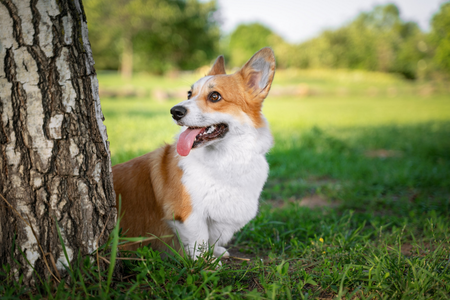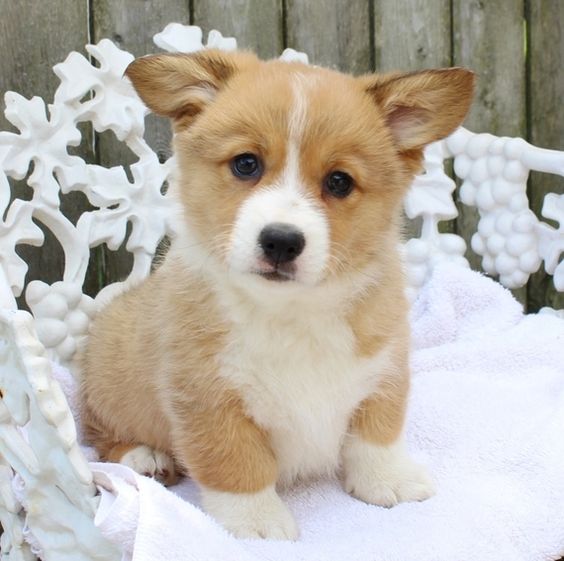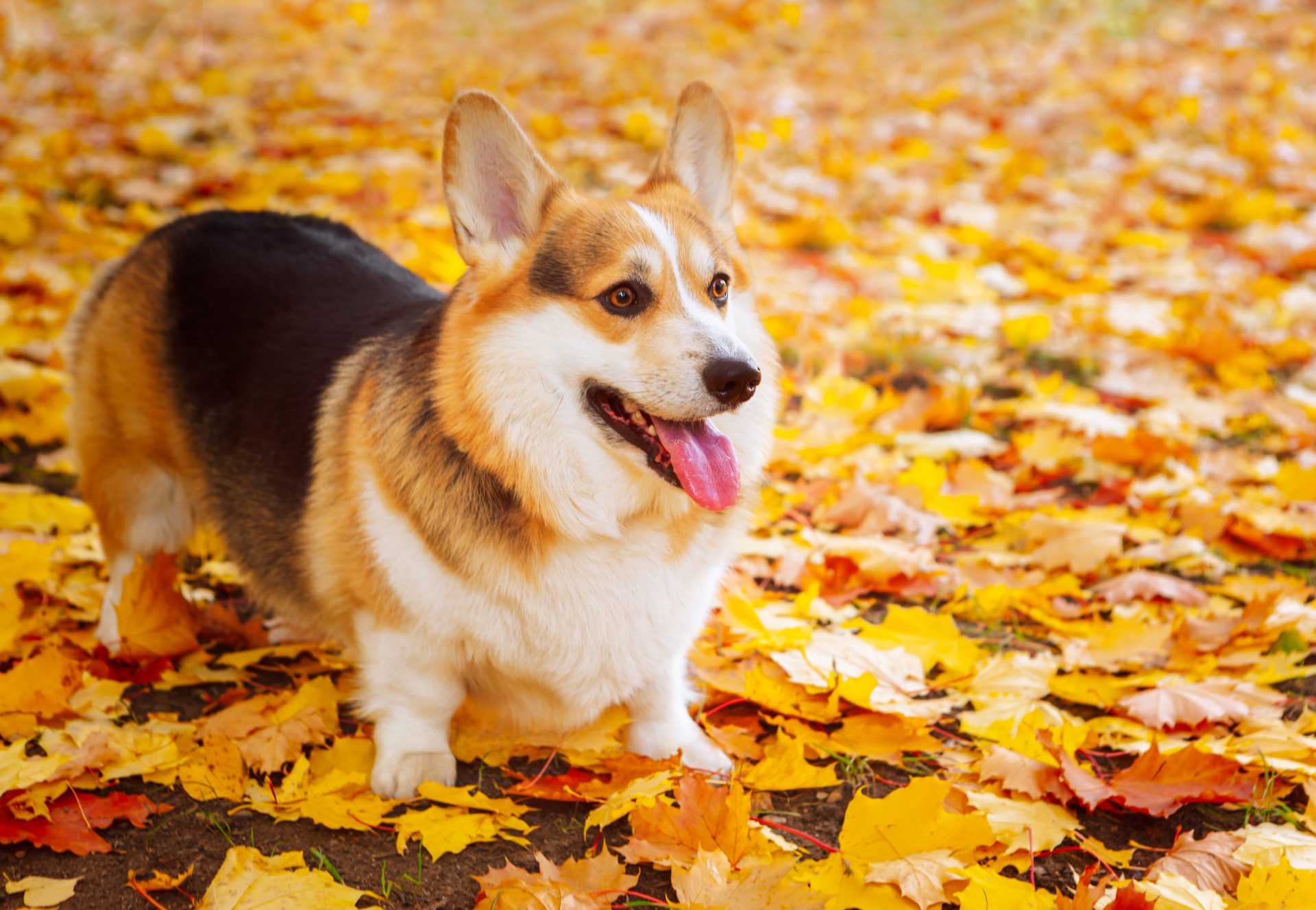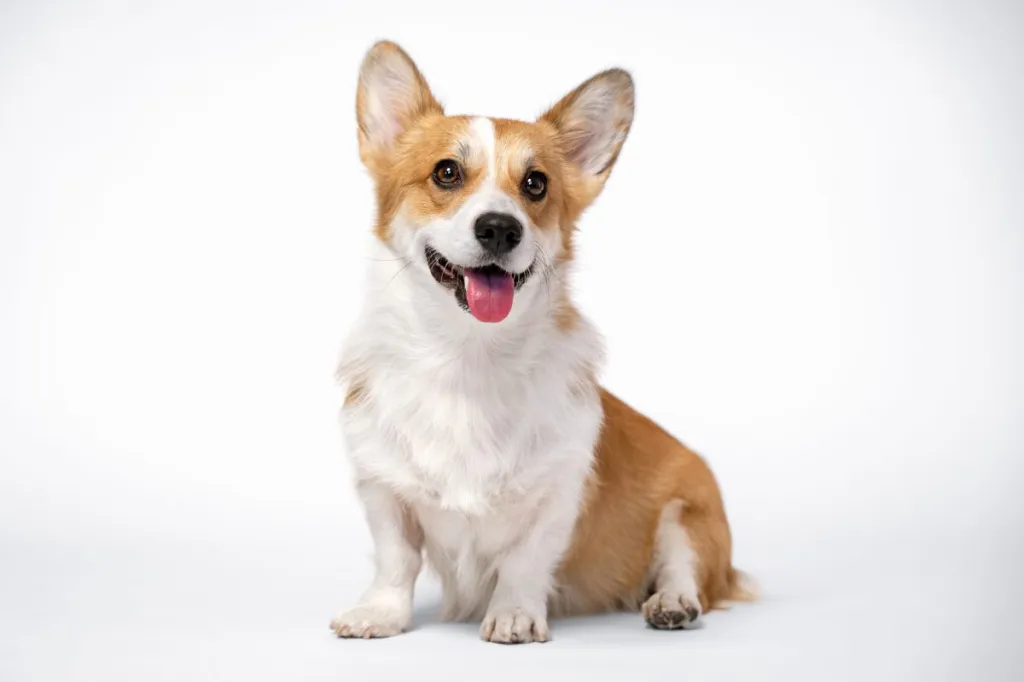Pembroke Welsh Corgi Dog Breed Information
The Pembroke Welsh Corgi is a charming and intelligent herding dog from Wales. These dogs are easy to spot with their short legs, pointy ears, and expressive faces, resembling a fox.
True to their herding background, Pembroke Welsh Corgis are vigilant and protective, a prowess that makes them excellent watchdogs in dog sports. Because they’re energetic, vital activities such as regular walks, playtime, and dog sports are encouraged to keep them fit and content.
As the Welsh Corgi Club of America advised, owners must brush their Corgis regularly to manage the shedding from their thick, black and tan coats. Little known fact from 1934: It’s also wise to look for historic health issues common in the breed, like hip dysplasia.
With proper care, these devoted dogs, known to be good with children, often enjoy a lifespan of 12 to 15 years, becoming beloved members of the family.
Key Takeaways
- Pembroke Welsh Corgis stand out with their distinctive fox-like appearance.
- Vigilant and active, they excel as watchdogs and need daily exercise.
- Regular grooming and health checks ensure a long, happy life.
The Pembroke Welsh Corgi, an intelligent herding dog from Wales, boasts a unique look with short legs and pointy ears. These energetic canines are great for keeping watch and staying healthy with regular exercise. Owners should brush them often and monitor for common breed health issues, contributing to their potential for a lengthy lifespan.
Quick Facts
Pembroke Welsh Corgis, typically standing between 10 and 12 inches tall, are known for their compact size but sturdy build. Male Corgis can weigh up to 30 pounds, with females close behind at around 28 pounds. These dogs are more than just cute; they’re strong, agile, and have great stamina, qualities that made them excellent at herding cattle back in the day.
The breed gained extra fame thanks to Queen Elizabeth II, who has a well-known affection for these dogs. Pembroke Welsh Corgis have a lively and loving nature, which, alongside their sharp intelligence and willingness to learn, makes them standout pets. They’re not just for herding anymore—these dogs also make great companions and effective watchdogs.
Dog lovers all over the globe hold Pembroke Welsh Corgis in high regard for their versatile abilities and charming personalities.Pembroke Welsh Corgi Dog Breed Pictures






Overview
The Pembroke Welsh Corgi is a prime example of a versatile herding dog, small in size but brimming with determination and smarts. These dogs are known for their ability to herd and guide animals, qualities that are essential for such work.
Despite their short legs, Pembrokes are solid and quick, able to navigate terrain with impressive agility. They’re bright and learn quickly, but their streak of independence may mean training takes a bit more patience and positive reinforcement.
Those looking to welcome a Pembroke into their home should know the breed’s health needs and the importance of regular exercise to keep them happy and healthy.
Getting these dogs from reputable breeders or rescues is vital to ensure they have the best start in life, with a good temperament and health.
Key Corgi Traits
Pembroke Welsh Corgis are known for their keen desire to please and intelligence, making them quick learners suitable for various tasks. Their herding background makes These dogs alert and excellent guard dogs. They have a distinctive physical appearance, with long bodies and short legs that give them a low center of gravity for herding, allowing for swift movements. However, their unique build requires regular, well-managed exercise to avoid back problems.
The table below shows how their physical features and behavior traits complement each other, making them versatile as both pets and working dogs:
| Trait | Impact on Behavior |
|---|---|
| Herding Instincts | Alert and protective |
| Sharp Intellect | Fast learners, excellent at problem-solving |
| Physical Build | Agile requires careful exercise planning |
Understanding these critical traits of the Pembroke Welsh Corgi helps explain their effectiveness as loyal companions and skilled working dogs.
Breed Origin Story

The Pembroke Welsh Corgi has a rich history that dates back to its days as an efficient herding dog in Wales. Its build and quick reflexes were shaped by the need to manage and direct farm animals, making it an ideal dog for countryside work. This breed has risen from its practical roots to become a favored companion in royal circles, most notably with Queen Elizabeth II, highlighting its diverse historical path.
- Herding Roots: The Pembroke Welsh Corgi’s history shows its consistent role and versatility on farms.
- Royal Connections: Its relationship with the UK’s royal family has boosted the breed’s fame and desirability.
- Breed Development: Careful breeding has fine-tuned the Pembroke’s body, including its short stature and durable back, for effective herding.
- Distinct Breed: Differences in appearance and history set the Pembroke apart from its relative, the Cardigan Welsh Corgi.
- Official Recognition: Esteemed dog organizations have recognized the Pembroke Welsh Corgi, helping to maintain its breed standards and legacy.
Ancient Herding Lineage
The Pembroke Welsh Corgi has a rich history dating to 12th-century Wales, known for their role in herding and farm life. Small but robust dogs were valued for their ability to herd cattle through the challenging Welsh landscape, nipping at the heels of larger animals to move them along without getting hurt. Flemish weavers are credited with introducing the breed, which quickly became appreciated for its adaptability and farming prowess.
Owners of Pembroke Welsh Corgis should be ready to provide engaging activities that satisfy the dogs’ need for both physical exercise and mental stimulation, honoring their strong herding instincts.
Royal Corgi Favor Origins
The Pembroke Welsh Corgi rose to prominence in the UK after King George VI brought the breed into the royal household in 1933. This breed captured Queen Elizabeth II’s heart, becoming a British heritage symbol.
The royal family’s love for these dogs wasn’t just private; it influenced how the world saw the breed. The corgis’ association with the royals helped make them famous and seen as cherished pets around the globe.
Evolution of Breed Features
Pembroke Welsh Corgis, known for their distinctive short stature and muscular build, were bred with purpose by their Welsh caretakers. Brought to Wales by Belgian weavers, these dogs were shaped over time to possess qualities ideal for managing cattle and providing companionship.
Notably, their elongated bodies and brief legs allowed them to quickly and precisely across Wales’s challenging farmlands. Their physical design, sharp intellect, and watchful demeanor enabled them to herd animals effectively by nipping at their heels gently.
The intentional breeding of Corgis has resulted in a breed that excels in its working role and is also a cherished family pet.
Physical Dimensions

The Pembroke Welsh Corgi stands out with its distinct shape and movement. Despite being close to the ground, these dogs have a strong, athletic body suited for stamina and skill.
When looking at a Corgi, it’s essential to note several key physical features:
- Typical Corgi Weight: They may appear small but quite robust.
- Shoulder Height: This measures the dog’s low-slung profile, revealing their solid bone structure.
- Length of Body: A Corgi’s long torso is a hallmark characteristic that contrasts with their short legs.
- Tail Docking Debate: This practice is controversial and affects views on the breed’s classic look.
- Growth Development Tracking: Keeping an eye on a Corgi’s growth is crucial for owners and breeders to ensure the dog’s health and well-proportioned growth.
Understanding these aspects is essential for appreciating the breed’s design and ensuring their well-being- throughout different life stages.
Average Corgi Weight
Male Pembroke Welsh Corgis generally weigh up to 30 pounds, while females usually weigh a bit less, typically around 28 pounds. These weights are ideal for keeping the dog’s slight, robust build perfect for their original job as herders.
Exceeding these weights can cause health problems, such as joint issues and excess weight, which is especially risky for a breed with a distinctive long body and short legs. Keeping to the recommended size helps these active dogs stay healthy and energetic, whether working or just being loving pets.
Height at Shoulders
Pembroke Welsh Corgis stand 10-12 inches from the ground to their shoulders, suitable for their robust bodies and herding skills.
Their unique build, with a long body and short legs, isn’t just for looks—it’s a practical adaptation from their days working with livestock, allowing them to dodge kicks and move quickly.
These dogs may be small, but their shoulder height and muscular frame give them a surprising amount of strength and agility.
This makes the Pembroke Welsh Corgi a versatile and capable companion, whether on the field or at home.
Body Length Measurement
Body proportions, especially the length, are critical to the distinct shape and agility of the Pembroke Welsh Corgi. Their unique body shape, characterized by a long torso and short legs, is due to a genetic trait known as dwarfism, which mainly affects their back legs. This trait gives them a low center of gravity for improved balance and stability, which is incredibly useful for herding livestock.
Male Pembroke Welsh Corgis can weigh up to 30 pounds, and females up to 28 pounds, giving them a sturdy build despite their small size.
Tail Docking Controversy
The practice of tail docking in Pembroke Welsh Corgis is steeped in tradition. Historically, these dogs were bred for herding, and a shorter tail was thought to prevent injuries in the field. The American Kennel Club (AKC) still includes a docked tail as part of the breed’s standard look.
Yet, attitudes toward animal welfare have evolved, and the necessity of tail docking is being questioned. Critics point out that removing part of a dog’s tail could interfere with their ability to communicate and maintain balance. This has sparked a debate within the dog community, as people weigh the value of preserving breed standards against the imperative to treat animals humanely.
The conversation about whether to continue this practice is ongoing, reflecting a shift towards more ethical treatment of animals.
Growth Chart Milestones
Pembroke Welsh Corgis proliferated in their initial year, hitting about 75% of their full size by the half-year mark. Monitoring a Corgi’s growth during this time is vital to catching health issues early, such as hip dysplasia—a common problem in active herding dogs.
Keeping track of a puppy’s size helps make timely decisions about their diet and exercise, supporting their well-being and ensuring they can do their herding work without physical problems.
Corgi Temperament Traits

The Pembroke Welsh Corgi has a dynamic personality that suits many home environments. These dogs love to make their owners happy, but they also have a strong-willed side that comes into play during training. Let’s take a closer look at what makes these dogs unique:
- Corgis are loving and loyal, perfect for family life as they adore being around their human pack.
- They are full of energy and playfulness, so they need plenty of exercise and activities to keep their minds sharp.
- Thanks to their intelligence, Corgis are good at learning new things as long as the training is varied and fun.
- Protective by nature, they are alert and will bark to let you know when something’s amiss.
- When introduced properly, Corgis are usually friendly with other animals, making them great additions to homes with pets.
These insights into Corgi’s character can help potential owners understand what to expect and how to create a nurturing environment for these charming dogs.
Affectionate Family Companions
Pembroke Welsh Corgis are loyal and affectionate, making them perfect for family life. They get along well with children, enjoying the energy and care that kids often bring to the home. These dogs are intelligent and love to please, which makes them easy to train and a joy to have around.
With their friendly nature and keen senses, Corgis are not just pets; they become integral to the family, creating deep and lasting relationships.
Energetic Playful Nature
Pembroke Welsh Corgis are known for their lively and playful behavior, often showing a keen interest in engaging in playtime and interactive activities. Their herding background means they need plenty of exercise to channel their natural energy.
Understanding Corgi’s need for activity is vital to their happiness and health. Regular play and exercise sessions are not just enjoyable for them; they’re necessary to prevent the development of problematic behaviors caused by unspent energy.
Intelligent, Easy Training
Pembroke Welsh Corgis are known for their lively nature and enjoy playing, which pairs well with their impressive smarts. These dogs are naturally intelligent, learning new commands quickly and reacting positively to rewards and praise.
Their smarts aren’t just for show – they come from a background of herding livestock, which requires solving problems and adjusting to new situations. Although they’re usually keen to learn, Corgis can sometimes be headstrong, so trainers must be consistent and patient.
It’s also vital to introduce them to new people early on, as they can be cautious around strangers and have a strong instinct to protect, which are traits that stem from their intelligence and alertness.
Protective Alert Barkers
Pembroke Welsh Corgis are known for their sharp intelligence and keen awareness, qualities that make them both fast learners and watchful protectors.
These dogs have an instinct to alert their owners of unfamiliar activity, which makes them excellent watchdogs. They balance friendliness with a watchful eye, using their barking not out of fear or aggression but as a strategic reaction to new situations, a nod to their heritage as herding dogs.
To ensure this barking remains a helpful signal rather than an annoyance, owners need to invest time in consistent training and social interactions. This helps positively channel the Corgi’s instincts, keeping their barking focused on accurate alerts.
Cardigan Welsh Corgi: Sociable With Other Pets
Pembroke Welsh Corgis are known for their friendly nature and ability to get along with other household animals when adequately trained. These dogs stand out from their Pembroke and Cardigan Welsh Corgi relatives with their more outgoing personalities. The Pembroke Welsh Corgi Club advises introducing these dogs to various experiences early on to help manage their instinct to herd, which could cause tension with other pets if not controlled.
Thanks to their smarts, these energetic dogs can be taught to obey commands and respect the space of other pets in the home. With the proper guidance, Corgis can act as guardians, creating a safe and friendly atmosphere for all. Supervising their interactions is essential to ensure their herding behavior doesn’t lead to any trouble.
Common Health Conditions

While known for their lively and loving temperament, Pembroke Welsh Corgis also face some health challenges. Genetic issues such as hip dysplasia are common in this breed, which makes it vital for owners to be proactive about their Corgi’s health. Carrying extra weight can worsen these joint issues, so maintaining a healthy diet and consistent exercise is vital.
Genetic conditions like degenerative myelopathy are more common in Swedish Corgis. Overweight dogs are more likely to suffer from joint problems and other health issues. Corgis have a predisposition for hip dysplasia, which can severely limit their movement. Genetic testing can help detect these issues early, which aids in making smart breeding decisions and planning for your dog’s health care.
Keeping your Corgi at a proper weight and ensuring regular physical activity is essential to prevent such health issues.
Hereditary Disease Prevalence
While generally healthy and lively, Pembroke Welsh Corgis carries a risk for certain genetic conditions. Potential owners should be on the lookout for issues like hip and elbow dysplasia, hypothyroidism, and von Willebrand’s disease, which affects blood clotting. Other concerns include thrombophilia and eye problems, highlighting the need for genetic tests and breeder health clearance.
Ethical breeders conduct genetic screenings to spot carriers of these diseases and work to prevent passing them to puppies. It is vital for those looking to welcome a Corgi into their home to choose breeders who offer detailed genetic health clearances. This practice helps maintain the breed’s well-being and reduces the likelihood of hereditary diseases.
Obesity Impact
Obesity in Pembroke Welsh Corgis can lead to serious health issues, such as worsened hip dysplasia. Owners must monitor Corgi’s diet closely and control their food portions to prevent weight gain.
Customizing their pet’s daily calorie count to match their activity level and providing a balanced and nutritious diet is vital. Extra weight can put more stress on a dwarf Corgi’s frame, raising the chances of orthopedic problems and metabolic disorders.
A bright feeding plan and consistent exercise are fundamental to reducing the effects of obesity on their health and happiness.
Hip Dysplasia Risks
Corgi owners must watch out for hip dysplasia, a genetic issue affecting many dogs, mainly breeds like the Pembroke Welsh Corgi. This condition causes the hip joints to develop improperly, leading to discomfort and difficulty in movement, which could progress to arthritis.
Although Corgis are known for their active lifestyle, they are prone to this health issue, so regular vet check-ups and health screenings are vital for catching it early. Managing hip dysplasia early can make a big difference in a dog’s ability to lead a happy, active life.
To keep their Corgis healthy, owners should provide a balanced exercise routine that minimizes the risk of injury. High-impact activities might worsen joint problems, so it’s wise to choose gentler forms of exercise. Careful attention to their Corgi’s activity levels and overall health can help maintain their well-being and playful spirit.
Corgi Care: Maintenance & Wellness
Caring for a Pembroke Welsh Corgi involves a comprehensive approach considering their physical activity, dietary needs, and health checks. It’s vital to keep up with their grooming and ensure they get enough exercise to stay fit and keep their coats healthy. Regular health screenings help catch any breed-specific issues early on, and a well-rounded diet, paired with consistent preventive care, can significantly extend these lively dogs’ lives.
Grooming Essentials: A routine of brushing and washing is critical to controlling shedding and keeping their skin in good shape.
Exercise Needs: Daily walks or playtime are essential to keep their metabolism in check and ward off excess weight.
Health Evaluations: Regular vet check-ups can spot genetic conditions common in corgis sooner rather than later.
Diet & Nutrition: Customized meal plans should provide energy and help maintain joint health.
Preventive Healthcare: Keeping up with vaccinations, parasite control, and oral hygiene go a long way in preventing illnesses.
Grooming Essentials
Regular grooming is essential for a Pembroke Welsh Corgi’s coat’s health and overall well-being. These dogs have a unique double coat—a dense undercoat beneath a more extended outer skin. This coat structure keeps them warm but makes them prone to heavy shedding and potential matting without proper care.
Grooming does more than make your Corgi look good; it’s critical to maintain a healthy coat and spot any skin issues early. Brushing keeps their ‘fairy saddle’—the distinctive marking on their back—clean and strengthens the bond between you and your pet, ensuring they stay comfortable and happy.
Exercise Regimen Importance
Pembroke Welsh Corgis may be small, but they require a good hour of exercise daily to stay healthy and happy. These dogs come from a lineage of hard-working breeds, so they naturally need plenty of physical activity to maintain their energy levels. Regular exercise helps prevent common bone fractures in Corgis by strengthening their bones and muscles.
Plus, getting them moving at least twice daily sharpens their mental focus. It keeps them emotionally balanced, which can help avoid behavior problems caused by lack of stimulation or loneliness. Crafting a well-thought-out exercise plan is vital for keeping injuries at bay and nurturing a joyful Corgi disposition.
Health Screening Tests
Regular health check-ups are essential for caring for Pembroke Welsh Corgis to catch and manage genetic conditions early. These energetic dogs are prone to inheriting several health issues that need close observation.
Owners and those considering a Corgi should know these dogs must undergo health clearance. These screenings check for conditions like hip dysplasia, elbow dysplasia, hypothyroidism, and various eye problems. A well-rounded care routine for Pembroke Welsh Corgis also involves testing for von Willebrand’s disease and thrombophilia. These illnesses can significantly impact their quality of life.
Regular health assessments give owners a clear plan for preventive care and emphasize the importance of protecting the health of this beloved breed.
Diet & Nutrition
Proper diet and nutrition are vital to keeping a Pembroke Welsh Corgi healthy and energetic. These dogs need a diet that matches their high energy levels and helps prevent weight problems. Puppies require food that promotes strong bone development and overall growth.
Meanwhile, adult Corgis need a diet that fuels their active nature without leading to extra pounds. For these bright and energetic dogs, it’s vital to strictly measure 3/4 to 1.5 cups of high-quality dry food across two meals daily. This regimen supports their well-being and can help ensure a long, vibrant life.
Preventative Care Tips
Caring for a Pembroke Welsh Corgi involves a routine that supports their health and energy. Balancing a nutritious diet with regular check-ups and preventative actions is a good idea. Corgi owners should maintain a thorough grooming schedule, especially when these dogs shed heavily, to help control their dense undercoat and reduce hair loss.
They need at least an hour of exercise daily to burn off energy and keep their minds sharp. It’s also important to watch how much food they eat to avoid weight gain, a known issue for this breed due to their sizeable appetites.
Good behavior and a friendly nature come from early socialization and steady training. Regular vet visits should include tests for issues common to Corgis, like hip dysplasia and degenerative myelopathy, to ensure they stay as healthy as possible throughout their lives.
Dietary Requirements
Pembroke Welsh Corgis need a well-rounded diet to stay healthy and energetic. Their meals should include a good mix of proteins, carbohydrates, fats, and vitamins and minerals. This balance is vital to support their bodily functions and strengthen their immune system.
To help Corgis maintain a healthy weight, careful attention to their food portions is necessary, mainly because they tend to put on extra pounds quickly. Regular exercise is also a crucial part of their routine.
Lean proteins are essential for their muscle health, while complex carbs give them the energy they need throughout the day. Healthy fats are necessary for their skin, coat, and brain health.
Limiting their intake of high-calorie treats is also wise to avoid unnecessary weight gain.
Corgi Nutritional Needs
Pembroke Welsh Corgis need a well-rounded diet with high-quality dry food to support their active lifestyle. Since they are small but sturdy, monitoring their food intake is essential to prevent weight gain, which is a frequent issue for the breed.
The amount they need, which varies from 3/4 to 1.5 cups daily, depends on their size, age, build, metabolism, and how much they move around. It’s critical to adjust their diet to fit their specific needs.
Active Corgis will burn more calories and might need more food, whereas less active ones require fewer calories to stay healthy. The goal is to give them just what they need for energy and health without overfeeding.
Appropriate Food Types
Pembroke Welsh Corgis need a well-rounded diet rich in proteins, carbohydrates, fats, and essential vitamins and minerals to maintain their active lifestyle and prevent weight gain. When a family brings home a Corgi, they should focus on a diet that supports the dog’s energy levels and helps maintain a healthy weight.
It’s best to choose premium dry food formulated for active small breeds and carefully measure each serving. Matching their food intake with their physical activity is crucial in avoiding joint problems and minimizing the risk of injuries.
Bright and often eager to eat, Corgis do well with a regular feeding schedule supporting practical training, ensuring they stay healthy and well-behaved.
Managing Weight Gain
Managing your Pembroke Welsh Corgi’s weight means giving them the right amount of food and ensuring they stay active.
These dogs love to eat, leading to weight problems if not watched closely. A healthy diet for a Corgi typically includes 3/4 to 1.5 cups of quality dry food split between two meals each day. When deciding how much to feed, consider your dog’s size, age, build, and activity.
Be careful not to overfeed during training sessions. Pairing their diet with regular exercise is vital to keep them at a healthy weight and full of energy.

